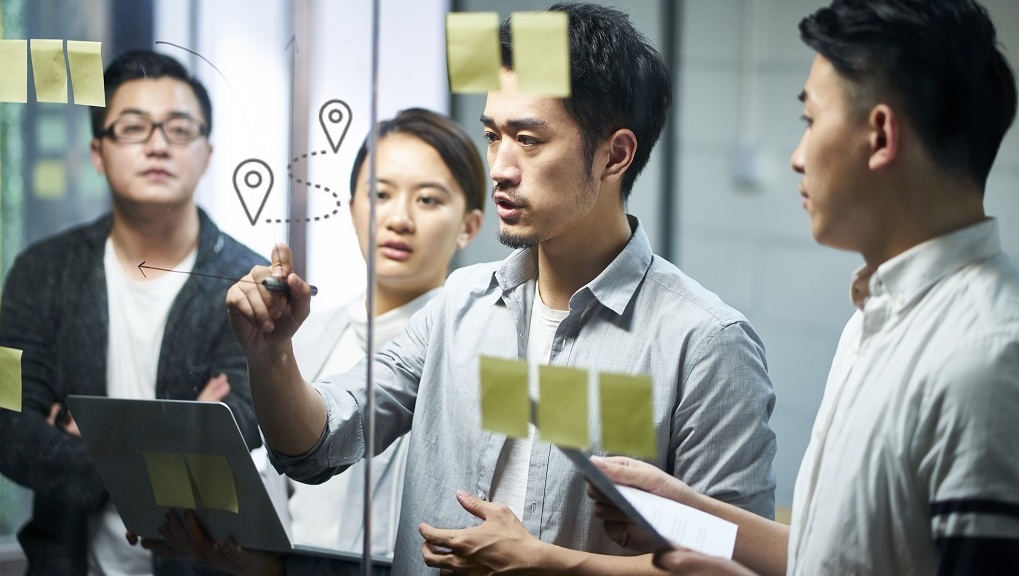
An ASEAN report says startups have the potential to drive innovation, create jobs, and spur economic growth, but they are also usually “high-risk.” Photo credit: iStock/imtmphoto.
Helping startups flourish requires not just a host of measures but a change in mindset.
E3Hubs cofounder Andrew Wong thinks he has found a potential unicorn investment in Mindanao.
An angel investor from Malaysia who has mentored small businesses across Southeast Asia for the past 15 years, Wong believes geo-location startup GeoPik has the potential to join the ranks of unicorns like SpaceX, Airbnb, and Lazada—privately held tech startups valued at $1 billion or more.
Before the pandemic, Wong had a base in the Philippines, where he was constantly on the lookout for a unicorn. “GeoPik was my first candidate,” he says. He believes its GPS-based technology could catapult GeoPik to become a unicorn given the right coaching, exposure, market access, ecosystem support, among others. GeoPik solves a problem that besets not just the Philippines but also many other countries in the world, he explains. "I hope they fly."
GeoPik founders are thrilled that Wong sees the company’s potential, but they also know they have a long slog ahead. Their business is still at a make-or-break stage when many startups end up closing shop due to lack of cash and ecosystem support. According to a 2019 report from policy advisory and research firm Startup Genome, only one in 12 startups become successful.
GeoPik CEO John Ryan Loyloy says they earned some revenues last year but are still in the stage of tweaking the solution, which pinpoints the exact location based on the longitude and latitude coordinates of an address using a GPS system so the end user, such as a postal or delivery service, can find it even if there is no house or building number.
Incubators in BIMP-EAGA
Although the company’s founders are from Cebu province in the Visayas region of the Philippines, GeoPik considers Mindanao, the country’s southernmost region, as its base after joining a Davao-based incubator program last year.
In 2016, BIMP-EAGA started a network of startup hubs or technology business incubators. The Startuphubs@BIMP-EAGA program was envisioned to facilitate exchanges of knowledge and resources to bolster startups. The project was a priority program under the subregion’s development blueprint Vision 2025.
Under the program, startup hubs were created in Bandar Seri Begawan, Brunei Darussalam; Pontianak and Makassar in Indonesia; Kota Kinabalu and Kuching in Malaysia, and Palawan, Zamboanga, and Davao in the Philippines. Wong helped set up the hubs as a World Bank-certified trainer in business incubation management.
However, no unicorn has yet come from the subregion. BIMP-EAGA covers remote and less developed areas of the four Southeast Asian countries that are geographically far from the national capitals, yet strategically close to each other. But Wong thinks that there are good startups everywhere, and he hopes that BIMP-EAGA would again set up an initiative to help them.
The ASEAN startup strategy
Tech startups in the subregion may get a much-needed boost from initiatives of a larger ecosystem.
In November, the Association of Southeast Asian Nations (ASEAN) released guidelines on creating an enabling environment for the region’s startups. ASEAN recognizes these new ventures have the potential to drive innovation, create jobs, and spur economic growth, but they are also usually “high-risk.” The guidelines define startups as enterprises that are young—typically not more than 3 to 5 years old and often technology- or innovation-enabled.
Startups in BIMP-EAGA, which is a subregion of ASEAN, are expected to benefit from these guidelines, which support regional collaboration to develop entrepreneurship and the startup ecosystem.
Citing a 2018 report from tech news site e27, ASEAN says at least 5,800 active startups were operating in e-commerce, fintech, enterprise solution, big data, or consumer goods and services across the region. Since 2012, Southeast Asia has produced more than 10 unicorns with a combined market value of over $34 billion.
The guidelines prescribe a holistic ecosystem approach that enhances the conditions for entrepreneurship in the long term instead of limiting support to grants or trainings for selected startups.
Having a flourishing startup ecosystem has a big payoff. In its latest report, Startup Genome says that in 2019, the global startup economy created nearly $3 trillion in value, a figure on par with the gross domestic product of the seven largest economies in the world.
Growth constraints
ASEAN countries will need to address common problems faced by startups, such as lack of access to capital, talent, mentoring, networks, and advisory services. New businesses are also constrained by burdensome regulations, including overlapping regulations across sectors. In some areas, startups also have problems with broadband access, cost, and quality.
Mobility restrictions during the coronavirus disease (COVID-19) pandemic accelerated digital adoption, creating opportunities for tech startups. However, increased competition and weakening demand also made it more difficult for some to operate.
Just take the case of Mindanao-based startup Agila Innovations, Inc., which saw a reversal of fortune with its food and grocery delivery service Streetby.
A couple of months after the government announced a lockdown in March, Streetby saw transactions triple with more people using the app to order food and groceries, says Agila CEO and founder Ronald Rhey Minoza at a webinar on BIMP-EAGA’s ICT prospects under the new normal.
But by June, orders dried up, he says, as new and bigger operators came in. The bigger players had bigger marketing budgets, more manpower, and better technology support that Agila just could not match. “While our competitors were offering free deliveries and discounts, at Streetby we had to increase our fees just to survive.”
Getting additional funding was not easy. Minoza had pitched to more than 100 investors but received only a few investments.
For many startups, their limited experience and training are among their biggest challenges, he says. “For our team, we just have to learn from our mistakes and move forward. We'll never give up—even if we're up against giants.”
“Global economic crises often become extinction events for startups. COVID-19 was no exception as startups edged perilously close to closing shop,” says Franch Maverick Lorilla, deputy director of the AGILab Technology Business Incubation program of the University of Southeastern Philippines in Mindanao, at the webinar.
Opportunities during a crisis
Policy makers and startup ecosystem leaders must explore measures that will make it easier for investors to inject capital in startups and to set up vehicles that can facilitate grants to startups, says Lorilla.
There is also a need to safeguard the pool of talent coming from startups, he says. Government agencies could hire the employees of startups that have folded. This is one way of preserving the specialization the employees have built.
Government can also help by procuring the services and products of tech startups. Working with startups or hiring tech talent can help drive ingenuity and innovation in public projects and services, says Lorilla.
Wong says startups should be constantly on the lookout for opportunities. “Even amid COVID-19, there are opportunities. The question is how you look at all these opportunities.”
He advises businesses to shift to a new mindset, and if needed, remodel their business plan and incorporate new methods or innovations. “Picture very clearly the strategy of how you're going to execute your business model over the next 3 to 6 months. If you are able to execute well in the next 3 months, you will more likely be able to execute well in the next 6 to 9 months or even 1 year down the road.”
Having clarity and focused discipline in executing the business strategy is vital, he adds. “Your business strategy should not be about survival. You must have a strategy to grow.”
This article was first published by BIMP-EAGA on 23 April 2021.

BIMP-EAGA
The Brunei Darussalam–Indonesia–Malaysia–Philippines East ASEAN Growth Area, or BIMP-EAGA, is a cooperation initiative established in 1994 to spur development in remote and less developed areas in the four participating Southeast Asian countries.

